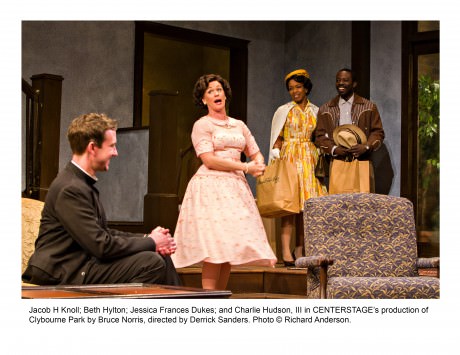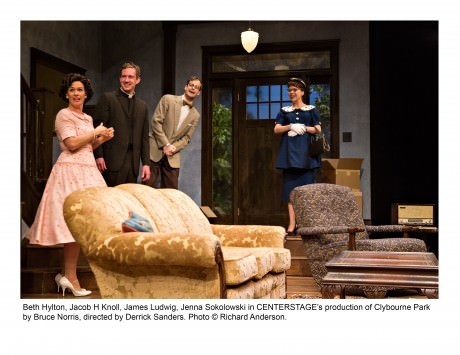You can’t live in a principle. It’s well and good in theory, but at the end of the day, it comes down to the reality of existence and how despite the passage of time some things never change. Communities, however, do change, but who is responsible for that change? To answer that question one must look at the long range sociopolitical motivational factors. As a part of The Raisin Cycle, CENTERSTAGE presents the Tony Award-winning Clybourne Park in rotating repertory with the world premiere of Kwame Kwei-Armah’s Beneatha’s Place. Directed by Derrick Sanders with a shared cast between both productions, this deeply moving and passionate drama picks up right where Lorraine Hansberry’s A Raisin In The Sun left off; presenting a satiric look at race and gentrification.
Scenic Designer Jack Magaw crafts a masterpiece for the Clybourne Park bungalow, transforming it between acts from an upstanding single family home into a rundown abandoned derelict piece of property. Magaw’s attention to detail in the latter half of the production really shakes up the notion of time having passed with crumbling walls segments and careworn graffiti covering various surfaces. The set transitions easily from well kept and respectable in 1959 to the rundown ramshackle mess 50 years later.
Director Derrick Sanders presents a cast of stunning talent in this intriguing well-paced drama. Transitioning these characters from the first act – which takes place in 1959 – to a completely and seemingly unrelated set of characters in the second act some fifty years later – is no simple task, but Sanders excels with unflappable excellence. Sanders explores the intricate balance of Bruce Norris’ work and the notion that you can never truly escape history with such a passion that the two acts of the performance are connected seamlessly despite the time passage in-between.
Sanders particular methods for blocking the production are deeply symbolic of the circular notion of the topics discussed in the text. Both acts one and two move in repetitive circles over the subjects of race and the importance of race in the community structure. Sanders blocks the characters’ movements on the stage accordingly, often having them pacing circles about the furniture (or lack thereof in the second act) during their more vehement arguments.
The acting is superior. Carrying one set of characters through such dense and sensitive subject matters is astonishing in and of itself – but to do so with a second group of characters in a similar fashion is beyond impressive. Each of the performers brings an element of the ripe satirical nature to the production while still maintaining a level balance of reality in their portrayals, be them in the 1950’s or the more modern second act.
The most stunning thing about the production is the way the perfectly positioned façade breaks down and shatters right before the audience’s eyes. At the beginning of the production we are introduced to the “Cleaver Family” lifestyle where conversations are chipper and dance merrily along the surface without any depth or meaning, and everyone is polite and quaint. The second act is introduced in a similar but much more modern manner; an amicable gathering with everyone being politically correct and socially polite. But watching these perfect facades disintegrate like a thousand panes of shattered glass erupting apart after an explosion – is truly amazing and the cast as a whole achieves this with their intense integrity to playing the characters for their honest truths.
With a harrowing ending, Cybourne Park navigates such troubled waters and is to be commended for finding the proper balance of comedy amid the darkness. One such scene comes to mind in the middle of act two when chaos erupts and the shit hits the fan. Kevin (Charlie Hudson III) and Steve (James Ludwig) command this scene that starts as a subtle argument but rages into a full blown Jerry Springer-like moment where everyone is flinging and slinging insults. Hudson and Ludwig are the driving forces of this particular moment that teeters precariously on the edge of hilarious and offensive; a vicious cycle of humor that might just go a little too far.
Hudson gives a stellar performance as both Albert in 1959 with all the well-rehearsed manners of a man who doesn’t wish to shake things up, and again as the easy-going Kevin in act two. His comic delivery is impeccable and is matched perfectly with his more infuriating moments of textual delivery. An ever-present performer, Hudson grounds both of his characters in the race and gender of his role, letting the tone of the text guide his speaking patterns into something truly amazing.
Ludwig, first as the self-righteous Karl and then as the literal asshole Steve, has a much more subtle character shift. Both characters are aligned in Ludwig’s physicality and vehement vocal tones of expression. When he begins to figuratively bang heads with Russ (Jonathan Crombie) the scene is loaded with dramatic intensity both men arguing with conviction.
Crombie drives his character’s viewpoints with a furious vehemence that blasts Karl out of the water and puts him in his place. The initial calm and rather static character portrayal of Russ makes Crombie’s explosive moments that much more detrimental to watch as it is discovered that he’s clinging to the threads of his emotional sanity in the face of everything that’s happened. His interactions with his doting wife Bev (Beth Hylton) are what craft such a simplistic façade in the beginning of the show, lulling the audience into a false sense of ease so that when those more dynamic moments of drama unfold they literally arrive out of nowhere.
Hylton is one of the more dynamic switches in her two character portrayals, going first from the very simple housewife figure to a powerful female lawyer in the second half. Her two instances on the stage could not be more different but Hylton masters them both with a keen sense of knowing how to guide her character through the scene. Her constant simpering and doting as Bev borders on obnoxious, giving the audience good reason to empathize with Russ being at the end of his rope, while her stoic no-nonsense drive in the second half creates a sense of strength and accomplishment.
I’d be remiss not to mention the funniest and deeply concentrated performer in the production, Jessica Frances Dukes. With a severe attitude and slight chip on her shoulder as the modern Lena, Dukes tangles with the best of them in the scene where racist jokes become not so funny. But the outstanding moments of her performance come from her embodiment as Francine; a woman caught in the middle of crazy people’s drama. Dukes has priceless facial expressions and minds her manners in the presence of others but has a sharp tongue when it comes to her character’s husband, regardless of what era it is.
CENTERSTAGE has assembled a fabulous cast for its superb production of Clybourne Park. Don’t miss it!
Running Time: Approximately two hours, with one intermission.
Clybourne Park plays through June 16, 2013 in rotating repertory with Beneatha’s Place as a part of The Raisin Cycle at Centerstage – 700 N. Calvert Street, in Baltimore, MD. For tickets, call the box office at (410) 332-0033, or purchase them online.






